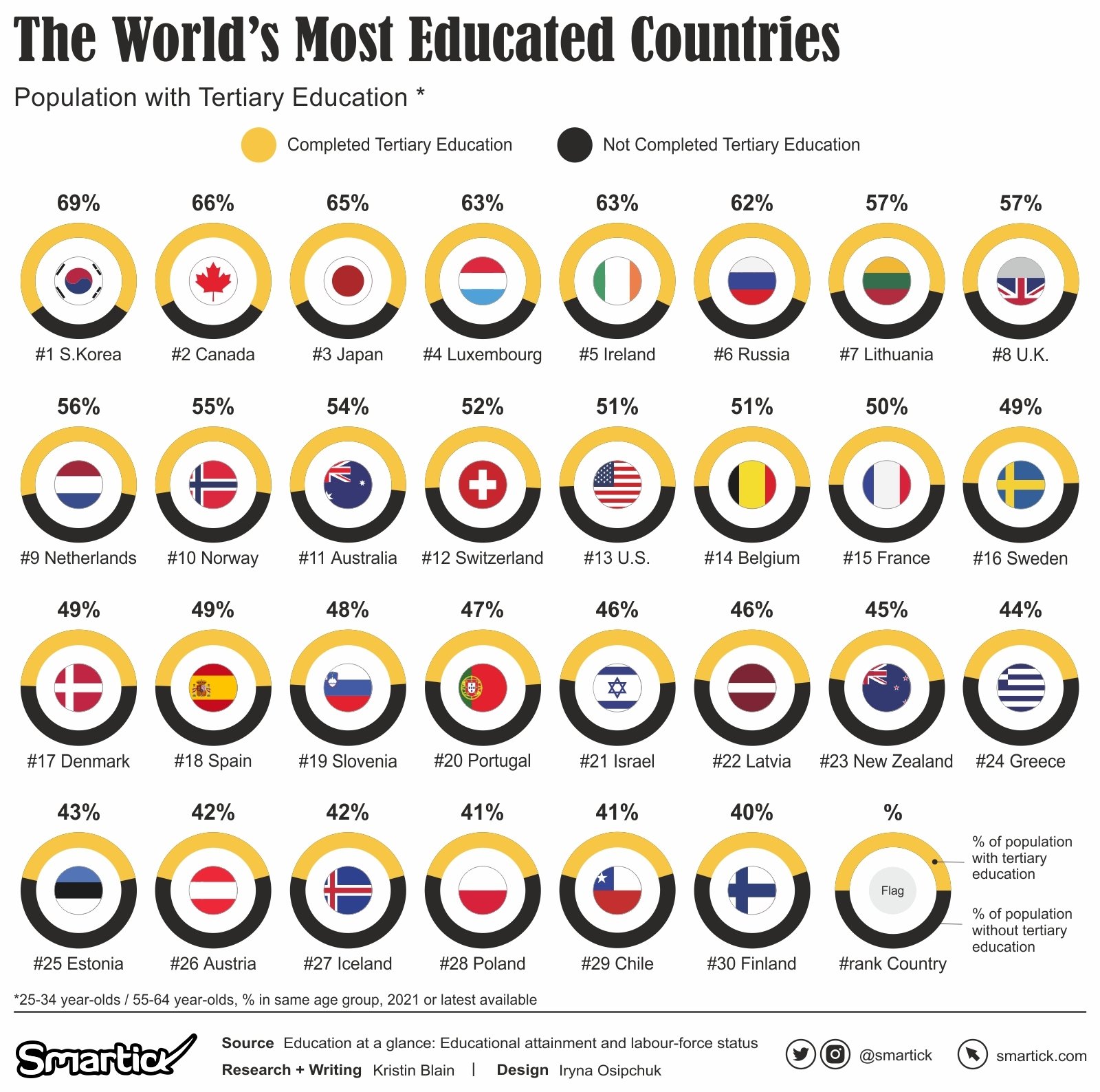
Education is a crucial aspect of societal development, shaping individuals’ lives and driving economic growth. In today’s globalized and technology-driven world, the demand for individuals with a broader knowledge base and specialized skills continues to rise. One key indicator of a nation’s educational prowess is the percentage of its population with tertiary education, which encompasses the highest level of education achieved. Let’s delve into the data and discover which countries boast the highest percentages, showcasing the importance of tertiary education in shaping societies.

According to data from the Organisation for Economic Co-operation and Development (OECD), South Korea takes the top spot with an impressive 69.3% of its population having completed tertiary education. Canada and Japan closely follow with rates of 66.36% and 64.81%, respectively. These nations have recognized the significance of equipping their citizens with advanced knowledge and skills to thrive in a rapidly changing world.
Luxembourg and Ireland rank fourth and fifth, with rates of 63.12% and 62.88% respectively, highlighting their commitment to fostering highly educated populations. Russia and Lithuania secure the sixth and seventh positions, with 62.09% and 57.48% of their populations having tertiary education. The United Kingdom and the Netherlands closely trail behind, both exceeding 55% in tertiary education rates. Norway and Australia complete the top ten, demonstrating their investment in higher education with rates of 55.03% and 54.31%, respectively.
It’s important to note that education is no longer confined to the elite, as the majority of countries have made significant strides in expanding access to education. Nevertheless, disparities persist, particularly in developing nations where implementing comprehensive nationwide education programs remains a challenge due to cost constraints. This underscores the fact that wealth does not always correlate with educational attainment.
Education systems worldwide share similar structures. They typically encompass primary education (the initial six to eight years), secondary education, and post-secondary or tertiary education, such as college or university. However, individuals may diverge from this path at various points to pursue different career paths, vocational training, military service, or other endeavors.
The high percentages of tertiary education in the top-ranking countries indicate their recognition of the importance of advanced education in meeting the demands of the modern labor market. Globalization and technological advancements have reshaped job requirements, necessitating individuals with specialized skills and a broader knowledge base.
The OECD average for tertiary education stands at 47.08%, indicating that many countries are striving to improve their educational landscapes. Among these countries, Israel, Latvia, New Zealand, and Greece showcase notable rates of tertiary education, ranging from 45.32% to 46.01%. Estonia, Austria, Iceland, Poland, and Chile also demonstrate their commitment to education with rates exceeding 40%.
These figures remind us that education is a powerful tool for both personal and societal development. By investing in the education of their citizens, countries foster innovation, economic growth, and social progress. Moreover, an educated populace is better equipped to address complex challenges, adapt to changing circumstances, and contribute to the overall well-being of their societies.
As we explore the most educated countries, it is crucial to understand that education extends beyond statistics. It represents an ongoing commitment to fostering a culture of learning, intellectual curiosity, and critical thinking. By investing in education, nations invest in their future, empowering individuals to unlock their potential and contribute meaningfully to a rapidly evolving world.
In conclusion, the data provided by the OECD highlights the importance of tertiary education in shaping the most educated countries. South Korea, Canada, Japan, Luxembourg, and Ireland lead the pack, with high percentages of their populations attaining advanced education. Nevertheless, education is a dynamic and complex endeavour, with each country facing unique challenges and opportunities. By continually investing in education, nations pave the way for progress, innovation, and a brighter future for their citizens.

